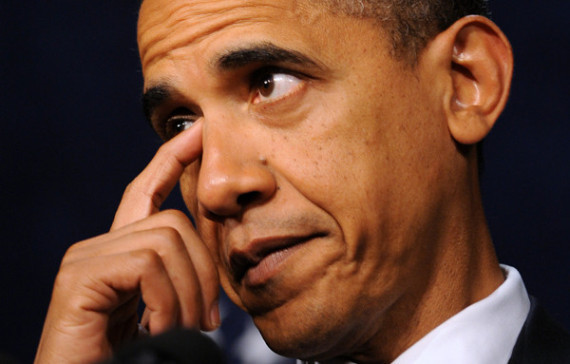 Yes, commitment is a wonderful thing.
Yes, commitment is a wonderful thing.Alabama Primary 2012 has come and gone. The financial boon enjoyed by broadcasters, hoteliers and restaurateurs catering to the media, and attention-seeking middle-level Republican leaders being solicited for endorsements has passed, not to be repeated until 2016. Because Alabama will be deemed one of the least competitive states in this November’s election, the attention paid to our politics will enjoy a similar slumber. The national media’s terminal case of ADHD will compel it to focus on Illinois, until it’s some other unfortunate state’s turn.
The inability of the national media to analyze the results in any state for more than a couple of hours on its primary night often leads it to miss critically important facts about what happened on the ground that day. Even the pampered caucus-goers of Iowa don’t get any meaningful post-caucus analysis, and it would be foolhardy for Alabama to expect any better. When you combine these facts with the media’s obsession with the Republican Kill-Thy-Neighbor primary, it’s not surprising that something amazing in the Democratic primary could be overlooked.
 I am referring to the relatively high number of Alabama Democrats who declined to vote for President Obama in our primary, and instead cast a vote for “uncommitted.” While total results are not available on the Secretary of State’s website, in those counties currently reporting, 16.8% of Democratic primary voters declined to vote for Obama, and voted “uncommitted.” Among those reporting counties, “uncommitted” actually beat Obama in at least seven counties.
I am referring to the relatively high number of Alabama Democrats who declined to vote for President Obama in our primary, and instead cast a vote for “uncommitted.” While total results are not available on the Secretary of State’s website, in those counties currently reporting, 16.8% of Democratic primary voters declined to vote for Obama, and voted “uncommitted.” Among those reporting counties, “uncommitted” actually beat Obama in at least seven counties.Once upon a time - before the presidential campaigns of George Wallace - uncommitted delegates were quite common in Alabama presidential primaries. Sending uncommitted delegates to a convention gave the state bargaining leverage. A number of loyalist Democrats continued the tradition into the Wallace era, providing Wallace foes a voting option in the primary. Since the election of Jimmy Carter, however, the phenomenon has faded into disuse, although remaining a legal option. Until now.
 Obviously, a significant number of Alabama Democrats felt compelled to register unwillingness to support the President. One caveat is in order about the 16.8% figure: as the map shows, a number of the counties not yet reporting in the Secretary of State’s system are in the Black Belt. Those counties will undoubtedly lower the 16.8% figure when full results are officially canvassed. But the figure will still be significant; those counties don’t account for enough of the state’s vote to lower it much. And the fact remains that “uncommitted” carried a number of counties.
Obviously, a significant number of Alabama Democrats felt compelled to register unwillingness to support the President. One caveat is in order about the 16.8% figure: as the map shows, a number of the counties not yet reporting in the Secretary of State’s system are in the Black Belt. Those counties will undoubtedly lower the 16.8% figure when full results are officially canvassed. But the figure will still be significant; those counties don’t account for enough of the state’s vote to lower it much. And the fact remains that “uncommitted” carried a number of counties.Several explanations offer themselves for this phenomenon. The most obvious is that of race. Many of the counties carried by “uncommitted” are overwhelmingly white, and were carried by Hillary Clinton in the 2008 presidential primary. Obama got a mere 10% of the white vote in the 2008 general election. But there is at least one county where race isn’t such an easy explanation, and that is Washington County.
 Washington County is 26.2% black. Common sense tells us that the Democratic primary electorate is going to have a much larger percentage of black voters than that. Compounding the complexity of analyzing Washington returns is the fact that white voters have not, for the most part, abandoned the Democratic primary for the Republican. Only 16% of the total votes cast for President in the Washington County primary were cast in the GOP contest. The Democratic primary is still, apparently, a white-majority affair. Even so, in picking through the precinct results for Washington County, I noted at least a couple of precincts where Obama’s total fell below the black percentage of the population reported by the Census. In sum, race may be the explanation, but the data isn’t good enough to draw any conclusions. If only the media had exit-polled the Democratic primary.
Washington County is 26.2% black. Common sense tells us that the Democratic primary electorate is going to have a much larger percentage of black voters than that. Compounding the complexity of analyzing Washington returns is the fact that white voters have not, for the most part, abandoned the Democratic primary for the Republican. Only 16% of the total votes cast for President in the Washington County primary were cast in the GOP contest. The Democratic primary is still, apparently, a white-majority affair. Even so, in picking through the precinct results for Washington County, I noted at least a couple of precincts where Obama’s total fell below the black percentage of the population reported by the Census. In sum, race may be the explanation, but the data isn’t good enough to draw any conclusions. If only the media had exit-polled the Democratic primary. The alternative explanation - and the two can coexist - is residual discontent among Democrats with the incompetent messaging of the Obama administration, which, as I have noted, has had disastrous effects on the Alabama Democratic Party. More serious are continuing concerns - which I also previously noted - that Obama’s team made a conscious decision to allow the Alabama GOP to torpedo the Democratic Party by leaving corrupt Bush U.S. Attorney Leura Canary in place in Montgomery, where her politically-motivated sham indictments contributed greatly to 2010 GOP gains. (Please sue me for defamation, Leura. I’d love to have subpoena power
The alternative explanation - and the two can coexist - is residual discontent among Democrats with the incompetent messaging of the Obama administration, which, as I have noted, has had disastrous effects on the Alabama Democratic Party. More serious are continuing concerns - which I also previously noted - that Obama’s team made a conscious decision to allow the Alabama GOP to torpedo the Democratic Party by leaving corrupt Bush U.S. Attorney Leura Canary in place in Montgomery, where her politically-motivated sham indictments contributed greatly to 2010 GOP gains. (Please sue me for defamation, Leura. I’d love to have subpoena power  to take depositions and unearth bank records. You’d love Tallahassee. And congratulations to Milton McGregor, the other victims, and their legal teams.)
to take depositions and unearth bank records. You’d love Tallahassee. And congratulations to Milton McGregor, the other victims, and their legal teams.)A look at the map above, and a passing familiarity with the 2010 Democratic casualty list, reveals that several of the “uncommitted” counties were represented in the Legislature by Democrats who lost their seats, or their leadership positions. Those Party leaders certainly weren’t motivated to support Obama in the primary, and it would take a very short leap of the imagination to see them, and their supporters, exacting a measure of revenge.
Yet another fact that should be considered is that many of the “uncommitted” counties still have Democratic courthouses. Voters must vote in the Democratic primary to have a meaningful voice in the election of their local officials. Among the “uncommitted” counties, for example, Jackson had contested races for probate judge, circuit clerk, superintendent of education, and commission president. Neighboring DeKalb, which Obama carried, had only a single local race for superintendent to draw voters. A larger primary cohort could well have brought in voters more likely to express racial bias in their votes.
Those counties carried by “uncommitted” are, for the most part, the foundation of the historic Democratic base in Alabama. A problem in those counties, whatever its etiology, signals a problem the Obama campaign badly needs to address. While solving the problem might not make Alabama competitive in November, Obama has “reach” states in the South - Virginia, North Carolina, and maybe Georgia - where every vote will count. In those states, Obama can’t afford to leave base Democrats off the bus.
 Having entered the White House like the fortunate prince of whom Machiavelli said, “Coloro e’ quali solamente per fortuna diventano di privati principi, con poca fatica diventono, ma con assai si mantengono; e non hanno alcuna difficultà fra via, perché vi volano: ma tutte le difficultà nascono quando e’ sono posti,” Obama had better hope that the sage was wrong in noting that “E chi crede che ne’ personaggi grandi e’ benifizi nuovi faccino sdimenticare le iniurie vecchie, s’inganna.” (Il Principe, Chapter VII. The quotes are the first and the penultimate sentences of the chapter. )
Having entered the White House like the fortunate prince of whom Machiavelli said, “Coloro e’ quali solamente per fortuna diventano di privati principi, con poca fatica diventono, ma con assai si mantengono; e non hanno alcuna difficultà fra via, perché vi volano: ma tutte le difficultà nascono quando e’ sono posti,” Obama had better hope that the sage was wrong in noting that “E chi crede che ne’ personaggi grandi e’ benifizi nuovi faccino sdimenticare le iniurie vecchie, s’inganna.” (Il Principe, Chapter VII. The quotes are the first and the penultimate sentences of the chapter. )






